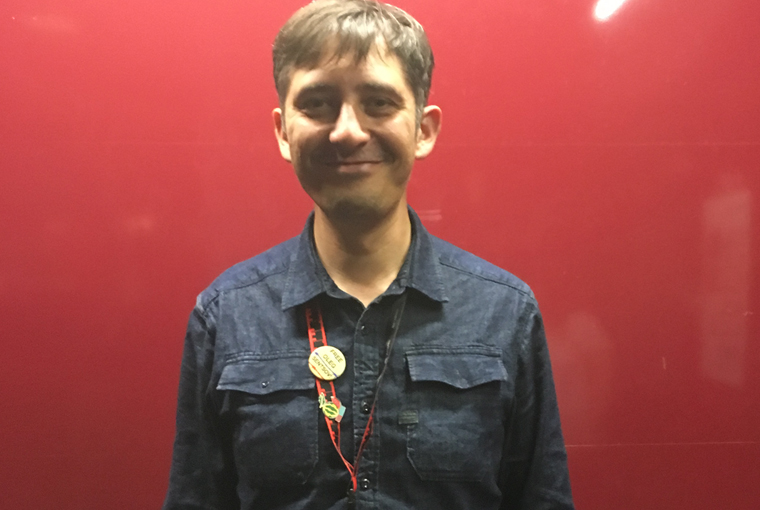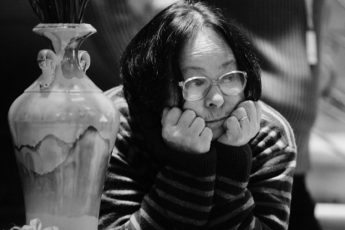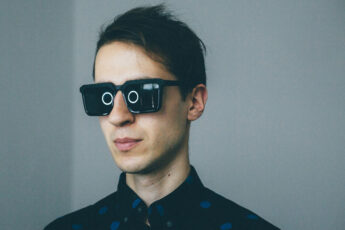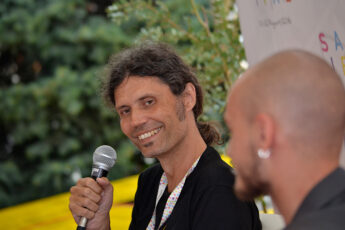
We met Ukrainian filmmaker Roman Bondarchuk at Karlovy Vary, where his debut fiction feature “Volcano” was part of the festival’s ‘East of the West’ competition. Bondarchuk speaks about the making of his movie and the life of the locals portrayed in his film.
Where did the story of your film originate?
It all started with the uncle of my now-wife. He was an inhabitant of a small town in the south of Ukraine, next to an artificial lake. In Soviet times he was the head of a big fish farm and when everything collapsed he started to look for a new job. He started to invent crazy business projects. He suggested to me as a joint venture the idea of digging up German bones from under the ground to sell them to relatives of the deceased in Germany. He told me that he’d seen it on television. So I took the camera and started to film him. Slowly I realized that it was interesting enough to make a film as we met so many characters, completely different from what I could even imagine. It took about four years to gather all the information and finish the script.
Where exactly does the film take place?
In the Kherson region, it’s right next to Crimea. Before it was just the steppe, but then Russians annexed Crimea and built checkpoints and customs and put their military forces there. It’s really on the borderline now.
Were people there before or did they move there because of the war?
It’s not a war zone. It’s a peaceful place. But because it’s quite a removed area, it’s difficult to communicate with the “central power”, which is why it looks so anarchic. People were put there in the time of Peter I. It was a wild place with no people and it was a big project to bring people from Central Ukraine and put them in Southern Ukraine.
What about the reservoir you mention in the credits?
This is an artificial lake that was built in Stalin’s time, in the 60s. Officially it was built to supply water to Crimea because the Soviet people couldn’t survive without fresh water. Tartar people had had modern techniques to collect water, but not for industrial needs. So they blocked the river and sank more than eighty villages as well as very important historical monuments like landmarks and graves of Ukrainian heroes and Cossacks. So it was also part of the project to remove the memory from Ukrainians and make them Soviet people.
Did you make a documentary before you made this feature?
No, we stopped making that documentary because our character died. Which is why we switched to fiction.
The character Vova talks about mirages in the film.
The mirages are another story. My grandmother told me they really exist because there are no woods there, it is just desert. It’s an optical effect that can be created in specific weather. People made artificial forests there in order to stop sand storms and agriculture and things. But now people cut the wood to heat themselves during wintertime so that’s why mirages keep coming back.
How did you invent the character who plays the OSCE representative?
This is only an artificial character because I needed an observer who will come there and collect information about this life. Somebody to tell the story. I decided to invite a non-professional actor. He’s a sound designer by degree and we have known each other for a long time. We graduated from the same film school. Since we decided to use mostly locals we needed to find this balance between professional actors and real people. For him it was good because we don’t know anything about the tricks and tools of actors.
We found the film to be very episodic but there were also comic moments. Did you intend the film to be a comedy?
Sometimes you laugh not because you are happy but when you have nothing left to do but laugh. That’s how they survive for years and that’s what I like about them. That they don’t dramatize their situation but find something funny in it.
Is the idea of digging up German bones funny or not?
That’s the special sense of humor. I’m happy that people felt this here because I was afraid that they would only see the suffering. Luckily they have a sense of humor.
Did you run into any kind of trouble while filming?
It’s difficult to call it trouble, but yes, when we first arrived, a local assistant of mine said we have to present ourselves in front of this official mayor. We came to his office and we made a presentation about the local casting we’d be doing. They said, “How can we trust you? Maybe you’ll take the most beautiful ladies and send them to a brothel in Turkey”. You never know who is making decisions out there. I thought I had a good relationship with the head of the area but I soon realized none of his promises were being carried out. Then I met a local businessman and he explained that this man never makes any decisions. The women around him are the ones who decide. They explained that when he came to power the women prepared a huge banquet. He got drunk and they filmed him on mobile phones. They blackmailed him and that’s why now he just sits at his desk doing nothing while the women make all the decisions.
Did the character end up there because of the circumstances or did he just decide to stay?
You can work for a rich international association, own a car, an apartment and a summer house, without knowing what it is exactly that you’re doing there. The work you do and its results never come together. So Lukas felt this crisis of a seven-year circle and he wanted to find the answer because he had no idea why he exists and who he is.
What is your next project?
I’m currently working on two scripts. We had so much left over after our filming of Ukrainian Sheriffs, we met so many people and so many new stories came that I’m trying to put them into some order and then decide how to proceed, whether with a documentary approach or with fiction.
Thank you for the interview.
Interview conducted by Moritz Pfeifer and Colette de Castro




Leave a Comment